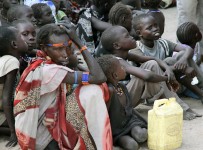
Renewed inter-communal violence in the restive Jonglei state has recently displaced as many as 50,000 people in and around the town of Pibor, South Sudan. The violence began in late December, when a column of 6,000 Lou-Nuer youths approached the town, which is largely home to members of the Murle community burning smaller villages and a Medecins Sans Frontieres clinic along the way.
The Sudan People’s Liberation Army, or SPLA, with the assistance of the UN peacekeeping force, UNMISS, was able to defend Pibor from falling to the Lou-Nuer youths, but not without displacing thousands of civilians. Yesterday, the Lou-Nuer youths began to leave the area and return back to their own communities. On the heels of this withdrawal, a high-level humanitarian delegation, led by members of the Government of South Sudan, traveled to Pibor town to assess the humanitarian situation as well as urge all parties to refrain from further violence.
Since April of 2011, 1,100 people from both the Lou-Nuer and Murle communities have been killed and 63,000 have been displaced in Jonglei state due to similar instances of inter-communal violence. Though the numbers from the newest spate of violence have not yet been confirmed, the UN Office for the Coordination of Humanitarian Affairs, or OCHA, estimates upwards of 50,000 people have fled Pibor and the surrounding areas. These individuals are in need of food, water, and shelter. An Agence France-Presse video illustrates the dire situation of civilians in Jonglei state.
The violence in Pibor is the latest in a long series of retaliatory attacks and cattle raids between the two communities. Indeed, the most recent recourse to violence on the part of the Lou-Nuer is in response to an August attack on their community by the Murle, which resulted in the death of at least 600 Nuer, the wounding of an additional 985, the abduction of Nuer women and children, and the theft of nearly 40,000 cattle. Much of this violence directed at the Nuer community was committed in a single day.
Since August, the Lou-Nuer community has demanded the return of women, children, and cattle stolen in previous Murle raids on their community. The Sudan Council of Churches and the government of South Sudan both sent delegations to Jonglei state in an attempt to negotiate a peaceful settlement between the two communities. These delegations urged the Murle to return the abducted Lou-Nuer children, women, and cattle. Unfortunately, these efforts have, to date, failed to bring the two communities together in a peaceful settlement. It is unlikely that the Nuer will de-escalate the situation until their stolen children, women, and cattle have been returned.
Cattle raiding is a long-standing problem in South Sudan, particularly in Jonglei state, where violence has historically been cyclical in nature. The United Nations Humanitarian Coordinator in South Sudan, Lise Grande, made note of the character of inter-communal violence in Jonglei during April, June, August, and most recently December of 2011, saying, “I am deeply troubled by this trend and the impact of violence on civilians has been significant. What is most worrying is that one attack leads to another, resulting in a spiral of attack and counter-attack.” Further, cattle are an integral part of both Murle and Nuer culture. Cattle ownership is a source of wealth and, given the dowry marriage system, critical for starting a family. Indeed, a young man cannot hope to marry without paying his future wife’s family a large number of cattle.
Outside of the retaliatory nature of cattle raiding in Jonglei, there are other underlying contributing factors to the cycle of violence, which affect communities throughout the state. These factors include, among others, severe underdevelopment in Jonglei state, a lack of capacity within both the local civil administration and the federal court system, the necessity for greater security sector reform, the prevalence of arms within communities, and harsh environmental conditions that require communities to traverse each other’s lands in search of water. Until these factors are effectively addressed, sustainable peace will likely not take hold in Jonglei state.
The government of South Sudan, South Sudanese civil society organizations—namely the Sudan Council of Churches, and the international community should respond to the cyclical violence in Jonglei state by focusing on both the immediate and underlying causes. The government and the Sudan Council of Churches should continue their efforts to negotiate a settlement addressing the violence between the Murle and the Lou-Nuer, and the international community should avail necessary resources to support these efforts. Longer-term efforts must also be bolstered or, in many cases, initiated to address the underlying contributing factors to the cycle of violence. As South Sudan rapidly approaches its one year anniversary as an independent state, the government of South Sudan, with the support of the international community, must redouble its efforts to ensure the security of civilian populations across the South’s many communities.
Photo: Recent inter-communal clashes between Lou-Nuer and Murle communities have displaced tens of thousands of people in Jonglei state. January 2012, Pibor, Jonglei State, South Sudan.(OCHA / Cecilia Attefors)

